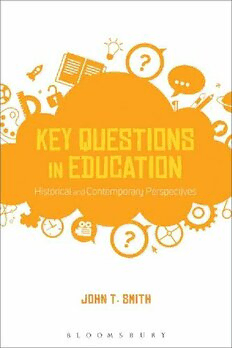
Key Questions in Education: Historical and Contemporary Perspectives PDF
222 Pages·2016·7.757 MB·English
Most books are stored in the elastic cloud where traffic is expensive. For this reason, we have a limit on daily download.
Preview Key Questions in Education: Historical and Contemporary Perspectives
Description:
The media is full of reference to failing schools, troublesome pupils, underperforming boys, disappearing childhood and a teaching profession in crisis as more and more teachers contemplate abandoning their careers. Key Questions in Education looks at the current and historical debates of each of these issues, examining how a multitude of stakeholders have viewed, and still view, childhood and schooling. In highlighting how these same or similar issues have persistently been debated throughout time, John T. Smith shows something of their complexity and the need to break apart these key enduring questions in education.Each chapter covers a key question such as: How far should the state interfere in education? Should schools feed their pupils? and Why do children misbehave? Analysing each key question, chapters discuss how such issues were viewed or defined in the past, what solutions and outcomes were envisaged and compare and contrast how this relates to where we are now. Clear links are made throughout between historical sources and current ideology, policy, practice and research. In opening up these debates through case studies and vignettes, students are encouraged to reflect on how these contentious issues might be resolved and how this affects them as future educators.This book centres on the nature of childhood and on the comparative responsibilities and rights of parents, politicians and teachers to nurture young people. The chapters are framed in the form of twelve key questions and, unusually for an education text, they trace both past echoes and present discussions on how these might be answered. All the questions are still receiving current and often impassioned debate, in parliament, staffrooms and the blogosphere, and their longevity shows something of their intractability. They include age-old questions of the conception of childhood, expectations of schooling, possible limitations to state involvement, forms of pedagogy, misbehaviour, gendered underperformance and even the provision of religious, citizenship, and sex education as compulsory elements of the curriculum. Recent arguments over free school meals are also seen within their historical context. There is also a discussion of the status of teaching as a profession, both in the present and in the past. The book concludes with a discussion of a number of scenarios depicting future schooling.
See more
The list of books you might like
Most books are stored in the elastic cloud where traffic is expensive. For this reason, we have a limit on daily download.
